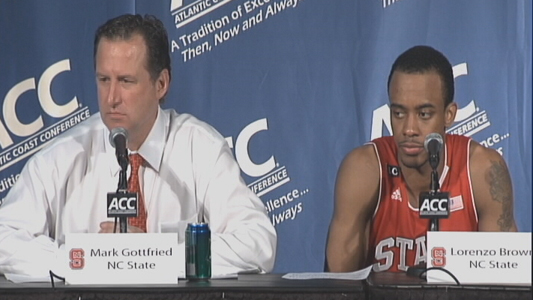A Rational Discussion of ACC Officiating
Posted by mpatton on March 11th, 2012I waited a few hours to write this article because I wanted a chance to digest the game and get past the officiating. Instead it became about the officiating in NC State‘s loss to North Carolina, which I think was bad throughout but also very one-sided. I don’t think there’s a conspiracy in the ACC. I also can guarantee I couldn’t do a better job than the guys on the floor. But I do think that referees, no matter how hard they try not to, come to games with biases that affect 50/50 calls. Officiating requires making a split-second decision. That’s why selling contact is so successful. There’s no slow-mo or replays, and officials can’t even wait to see which way you fall (when they do, everyone including myself rips them for making late calls). Blocks and charges are the most difficult of these calls. Anytime someone falls down there are three choices: block, charge or no-call. But someone could hit the deck at any time. It’s not like players raise their hands and say, “Sir, I’m going to get a little out of control here but not lower my shoulder. Keep an eye on my defender’s feet for me.”
The biases come into play when it’s truly a 50/50 call, but you have to make the call. No matter what, officials are going to know that North Carolina is a good team and Tyler Zeller is a good player. Even if you brought in a top-notch official who’d never heard of Zeller, it wouldn’t take very long for him or her to figure it out. Knowing this, when a 50/50 play happens with Zeller, an official is more likely to give him the benefit of the doubt. In an ideal world, would they see everything and make the right call regardless of the context (player, team, time, etc.)? Yes.
Blocks and charges were not called correctly or consistently in Saturday’s North Carolina – NC State game. Too much baggage entered the equation. The most glaring instance showcased CJ Leslie, who had a couple of questionable calls go against him in less than two minutes (his first foul on Zeller’s lay-up was the right call). The second of the calls in question was his fifth foul. Nearly the exact same play that was called a charge against Leslie went uncalled in the final 10 seconds as Kendall Marshall knocked down the shot that proved to be the difference-maker.
[Author’s Note: Those weren’t all of the missed calls, just an example of their inconsistency. Tyler Zeller’s fifth foul also exhibited very little contact, and DeShawn Painter had at least one foul called against him where he couldn’t have gone up straighter. I’m sure there are plenty of other instances.]
In the end, bad calls didn’t decide this ACC Tournament semifinal game. But they did change it for both teams.











































Eh, I didn’t think it was that one-sided. It was definitely called very poorly and very inconsistently, which State couldn’t handle as well because their bench is so short. Ultimately, it’s hard to argue that the officiating didn’t decide the game given how close it was and how many fouls were called, but it’s also obvious that NC State was in a very good position to win despite how the calls impacted them and then frittered it away. They weren’t mentally focused the way they needed to be in the last couple of minutes.
Go ‘Noles!